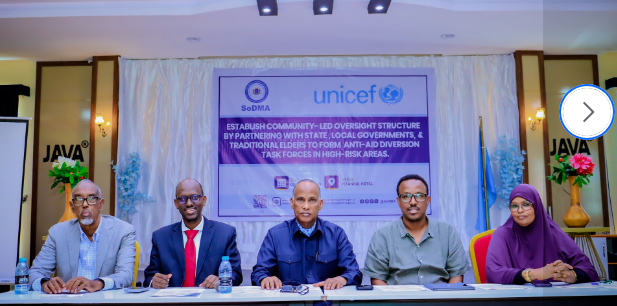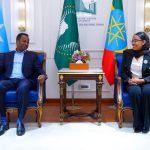Mogadishu, Somalia –SONNA– The Somali National Disaster Management Agency (SoDMA) convened a critical consultation meeting in Mogadishu today, directly addressing the pressing issue of preventing the misuse of humanitarian aid. The gathering emphasized ensuring that vital assistance reaches affected populations in Somalia efficiently, fairly, and equitably.
The high-stakes meeting brought together a diverse group of stakeholders, including representatives from the Banadir regional administration, various civil society organizations, and other key sectors of Somali society. Discussions delved deeply into the existing challenges that impede the seamless and transparent flow of aid, fostering an open exchange of views and culminating in the formulation of practical recommendations aimed at significantly improving the aid delivery system across the nation.
Officials from SoDMA highlighted the paramount importance of accountability and transparency throughout all humanitarian aid operations. They strongly advocated for a united front against corruption and any form of abuse associated with aid distribution, stressing that collective action is essential to safeguard the integrity of humanitarian efforts. Furthermore, the agency called upon the broader community to adopt a more proactive role in monitoring and supervising the aid process, recognizing that community vigilance is a vital layer of oversight.
SoDMA publicly affirmed its dedication to protecting the rights and dignity of vulnerable individuals who depend on humanitarian assistance. The agency asserted its firm resolve to ensure that all aid is distributed in strict adherence to established humanitarian principles, international legal frameworks, and the pertinent laws of the Federal Government of Somalia. This commitment serves as a crucial guiding principle for all its operations.
In a significant outcome, the meeting concluded with a unanimous agreement to establish a specialized technical committee. This committee will be tasked with the crucial mandate of devising and implementing strategies to prevent the abuse of humanitarian aid. Its formation is also expected to foster enhanced cooperation and coordination among all relevant parties involved in the complex ecosystem of aid delivery in Somalia. This collective effort is aimed at bolstering trust, optimizing resource allocation, and ultimately ensuring that assistance genuinely serves those in most dire need.





